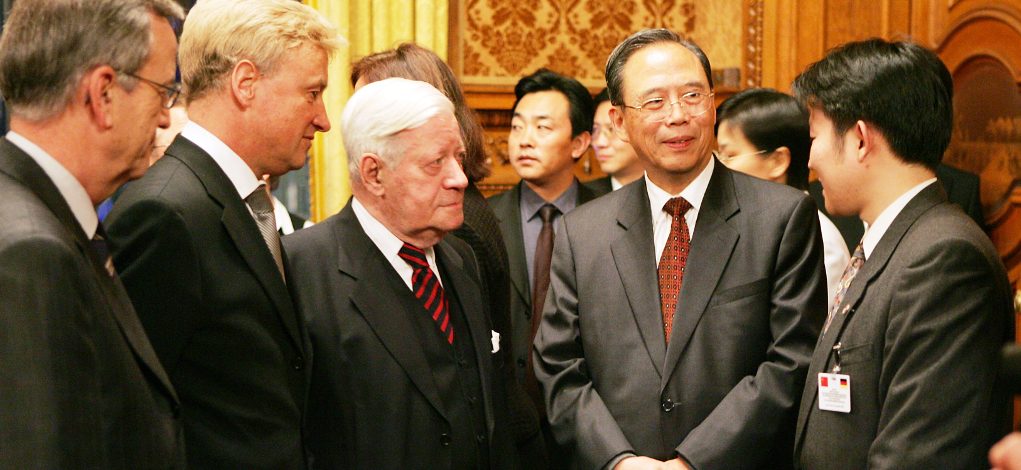Dates: September 14-16, 2016 | Apply here
[Oops, the opportunity has already expired. Sign up to AlphaGamma weekly newsletters to stay ahead of the game]
Location: Hamburg, Germany
Hamburg Summit 2016: China meets Europe
The Hamburg Summit was initiated by the Hamburg Chamber of Commerce in 2004 as a platform for an open dialogue between Europe and China with the goal to improve the economic relations and the understanding of each other.
The Hamburg Summit has today an international reputation as the most relevant Sino-European economic forum, as the participation of the leading Chinese politicians like Wen Jiabao (2006), Ma Kai (2010) and Wan Gang (2012) exemplifies.
Topics
The following topics will be addressed in panel discussions and keynote speeches during the conference from our high-level speakers from China and Europe:
Made in China 2025 – Industrial Transformation in a Digital World
China is at a critical juncture of its economic transition: the government’s strategy “Made in China 2025” strives to modernise industrial manufacturing and improve competitiveness in key industries through digitalisation.
The ultimate ambition is to turn China into an industrial superpower delivering innovative, cutting-edge technology.
How does this digitalisation process change the businesses of European and Chinese enterprises? What are the implications of “Made in China 2025” for leading European high-tech enterprises? How can China and Europe tap potentials of cooperation? Can and should Germany’s “Industrie 4.0” contribute to China’s digital transformation?
EU-China Investment Cooperation – A European Era of Chinese Capital?
The rapid economic transformation in China has paved the way for a new global wave of outbound FDI and financing promises from China: Chinese firms are increasingly diversifying their investments also in Europe targeting energy, advanced technologies, R&D capacities, brands and infrastructure projects.
Can Chinese capital help Europe´s economy to recover? What are the areas of shared interests between China and the EU for future bilateral investment cooperation? How can Europe and China move towards a more level playing field? What new strategies and trends of Chinese investment in Europe can be identified? What are the implications of Chinese FDI for the different European states?
Innovation Through Cooperation? – R&D Partnerships Between China and Europe
Innovation is a crucial driver for economic growth in China and Europe. The impressive history of bilateral collaboration features many successful projects for developing new technology solutions. Despite different innovation systems and technology requirements, the potential for future cooperation is significant.
How do innovative concepts and new technologies contribute to strengthening China’s and Europe’s economies? How can R&D cooperation enhance EU-China business relations? Is the legal framework for R&D collaboration between China and Europe adequate? How should China and Europe address and overcome existing challenges in R&D collaboration?
Better Connecting China with Europe – XI Jinping’s „Belt and Road Initiative“
With the ambitious “Belt and Road Initiative”, China envisions to create a modern version of the ancient trade routes, which centuries ago established an important link between China and the Western world.
Today, Beijing is again looking beyond its borders for new investment and trade opportunities and is reaching out across Central Asia to Europe, Africa and the Middle East with the promise of new financing sources and infrastructure projects.
Will “Belt and Road” as Beijing’s signature foreign policy project be a win-win project for China and Europe? What opportunities do the planned infrastructure and logistic projects bring for European companies and how can they profit from them?
Green Economy – China’s and Europe’s Ways to Sustainable Growth
Severe environmental pollution is putting a heavy strain on China’s population as well as on economic growth. The country is taking considerable steps to overcome these tremendous environmental issues. Pushing forward green growth, China has become a lead market for renewable energy and e-mobility.
Beijing invests enormous sums in energy efficiency and cleaner production. Clean transport and highly efficient waste management aim to make urban areas more livable.
Will China’s economy become a green success story? How can Europe contribute to solving the environmental challenges? What opportunities does an ecologically sustainable development create for China and Europe?
The Internationalisation of China’s Renminbi: Becoming a Global Currency
The increasing global use of China´s currency for trade and investment purposes confirms the country´s rising economic status. RMB internationalisation promises substantial business opportunities by facilitating trade and opening up new investment channels. At the same time, the rise of China´s currency poses fundamental challenges to the global monetary system.
How can Europe and Germany maximise the benefits from this long-term process? How will China manage further financial liberalisation to move forward with its currency internationalisation project? And will China – and Europe – cope with the volatility associated with China’s increasing global financial and monetary integration?
China’s Economic Transition – A Challenge for a Fragile Global Economy?
China’s economic transition shapes and shakes the world economy as its economy is shifting to lower levels of growth. Traditional industries are grappling with serious over-capacities, but new drivers of growth have yet to demonstrate their power. As China tries to rebalance its economy, Europe fears potential effects of a hard landing.
What are efficient ways for China to establish a new growth model? What are the future economic prospects for the second-largest economy? What effects does lower growth have on the global markets? How can European companies adapt their strategies and identify new business opportunities in the Chinese market?
New Customers?! The Rise of the New Chinese Middle Class
Through its economic transformation, China hopes to unleash an enormous wave of consumer spending during the next 20 years. With rising incomes especially in urban China, the spending pattern of this emerging consumer group will evolve and create new opportunities for the foreign and domestic service and retail sectors and for Chinese and European brands.
Simultaneously, demographic shifts and a rapidly ageing society create increasing demands in social services, calling for a reformation of the healthcare system and social security services. Who is the new Chinese middle class? What are their consumer preferences and demands? How do European companies have to adapt to this new customer group?
A New Global Trade Order Shaped by Regional Trade Agreements – What’s in it for China and the EU?
A new global trade order is in the making. Not only that the global centre of economic gravity is moving towards Asia. New (mega-regional) trade agreements and initiatives are on the rise and are changing the way how global trade will be operated in the future. These developments and the current discussion on the Market granting Economy Status to China will shape the reality of EU-China commercial interactions for the coming decades.
Can these trade developments boost the economic relations between the EU and China? How can new trade rules pave the way for fair treatment of companies in both Europe and China? What are the stumbling blocks for deeper trade integration of Europe and China?
For more business and career opportunities, check our opportunities section and subscribe to our weekly newsletters.






